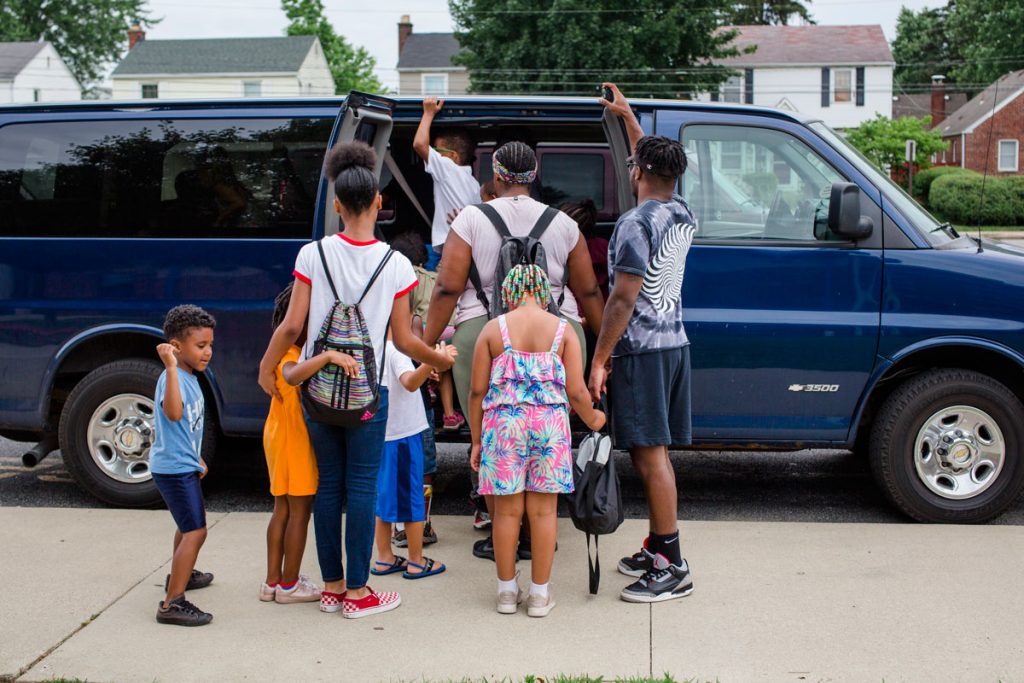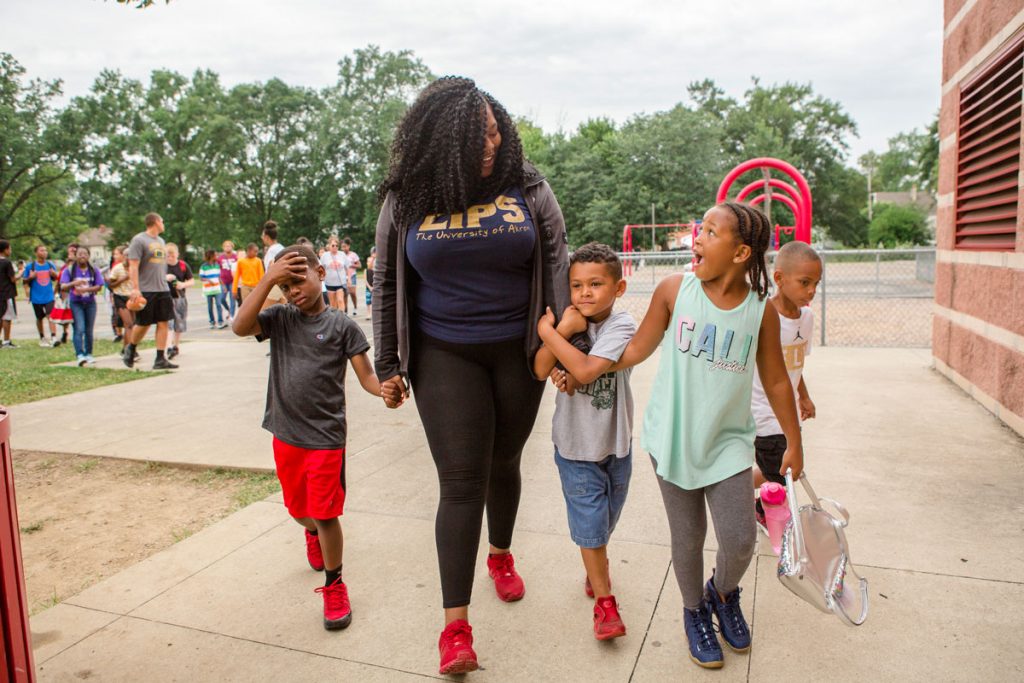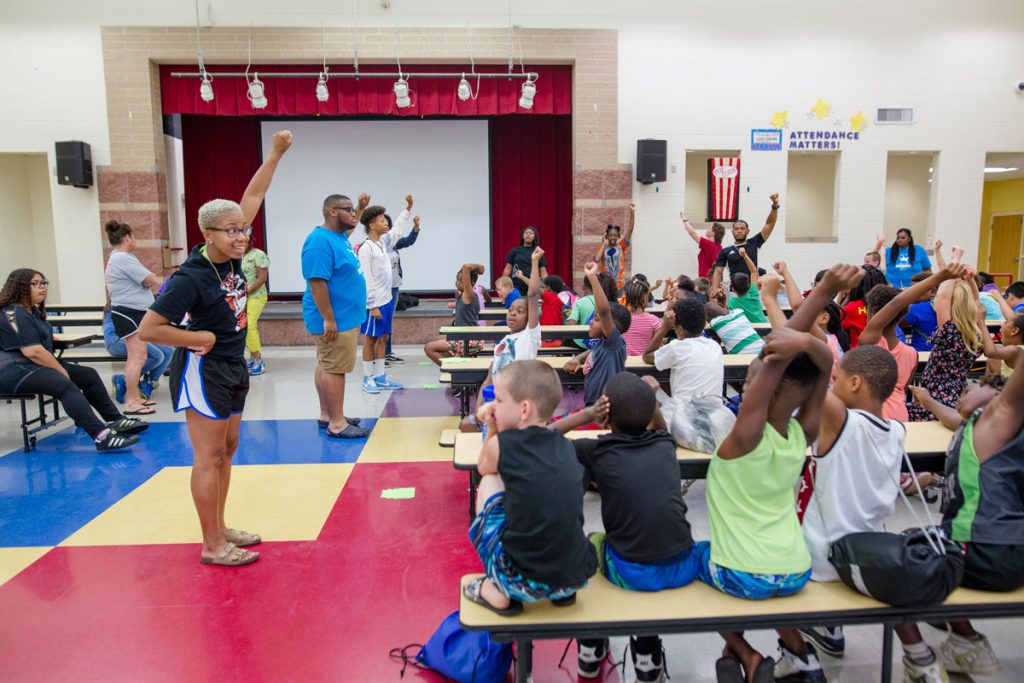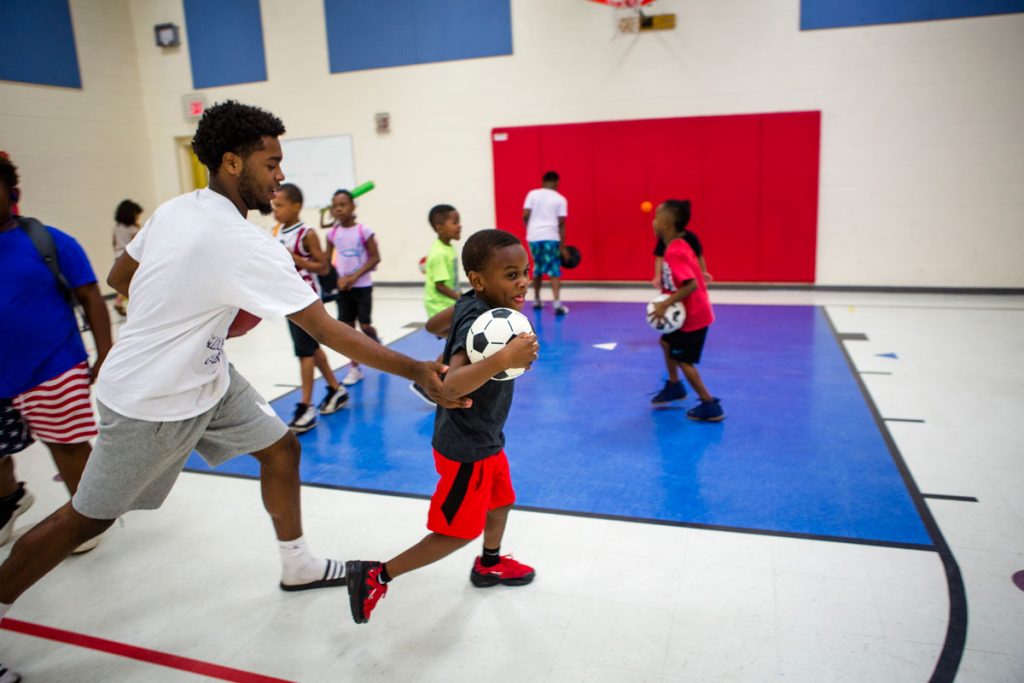Columbus Does Good: Community for New Direction

At 9 a.m. on a Tuesday in July, dozens of children from around Franklin County pile out of vans and into a west side elementary school. Some grab breakfast; others head outside to play before morning exercise. Greetings ring out across the school’s common area.
“We’re the best-kept secret in Columbus,” Susie Shipley-Norwood jokes. Shipley-Norwood, Community for New Directions’ Director of Alcohol and Other Drug (AOD) Prevention Services, also directs the organization’s six-week summer day camp. More than 200 students from high-risk areas enrolled in camp this summer, and all spots were filled on the first day of registration. Long-term impact is a theme here; many of the staff members bene ted from CND’s programs as youth and have returned to pay it forward.

Thirty Years of Growth
CND started 30 years ago in a two-bedroom apartment in Sullivant Gardens, staffed solely by volunteers who saw a need for the children in their community to make positive choices and find opportunities for growth.
Today, CND has over 40 full-time positions, serving children, youth, and adults in high-crime and high-need areas around Columbus. With primary funding from the ADAMH Board of Franklin County, CND has been able to step up when other agencies have closed. Their area of focus is ATOD-V (Alcohol, Tobacco, Other Drugs, and Violence), with programs in prevention, intervention, and treatment, all tailored to be sensitive to age, culture, and gender.
During the school year, CND offers an after-school substance and violence prevention program, as well as in-school leadership training for elementary through high-school students. Their Future Opportunities Created for Urban Students (FOCUS) program offers high-schoolers professional development activities, community speakers, and a week- long bus tour of historically black colleges and universities. Students choosing college receive a small scholarship and everything they need for transitioning to dormitory life.

The students CND serves are primarily from Black, Hispanic, and white Appalachian communities. Many live with a single, female head of household and see few positive adult-male interactions in their home lives. Many live in non-English-speaking homes. Financial instability, substance use, and violence often are part of their world. CND provides the safe, stable environment these students need to build a positive future, while also assisting the adults they depend on.
“The family aspect is, I think, what makes us unique,” says Kari Roll, CND’s Director of Development and Community Relations. Families are invited and included, with the hope that participation will spark conversation and connections at home.
Paying it Forward
Not only are adults returning to the programs in new capacities; they are bringing their own children along. In Whitney Garrett’s summer camp classroom, 11-to-14-year-old students read library books quietly at their desks during morning reading time. Garrett, a social worker, joined CND’s programs at age 11, participated in FOCUS, and has transitioned into a camp instructor, marking 19 contiguous years with the organization. “I believe, truly, that CND is very impactful,” she says. “Compared to my siblings—I graduated; they didn’t. I went to college. I was offered opportunities I never would have experienced otherwise.”

Garrett’s 12-year-old daughter, JaNiya, is in her class. When asked if she feels empowered because of CND’s programs, JaNiya breaks into a huge smile. “Yes!” she exclaims. “I had a friend in school; he was bullied a lot, and he wrote a bad note. I talked to him, and I told him that’s not OK. It’s a short life; you wanna live it. And he’s changed. Now, he wants to live.”
BROUGHT TO YOU BY
Creating Rich Connections
In the school’s common area, the 8-to-10-year-old group is having an ATOD lesson. Their curriculum is the National Institute on Drug Abuse’s “Brain Power,” a science-based program focusing on brain and body health. “Hippocampus!” “Learning!” “Amygdala!” “Emotions!” the group shouts together in response to fast-paced questions. After about five minutes, the children settle in to draw the brain hemispheres and limbic system on colored paper.

Summer day camp includes physical and wellness activities, social and emotional learning, daily reading time, meals, and, of course, field trips. The students go fishing; they go to the zoo, Zoombezi Bay, COSI and movies. They meet first responders and community leaders and even have a special basketball camp led by Scoonie Penn—all things they may not get to do otherwise, and all rich learning opportunities.
The registration fee is nominal—“sort of a commitment fee,” according to Roll. CND’s funding supports all of the other costs, keeping all students on a level playing field. And that level playing field builds connections that keep campers coming back year after year, even after they have aged out of the programs.
Aracely Reyna, an occupational therapy student at Capital University, joined CND’s programs at age 12, participated in summer camp, and now is part of the camp’s adult staff, striving to build meaningful connections with all age groups before she takes on graduate school. “Behind every kid is their life story,” she explains. “I had the chance to have the rewards for myself. Now, if I can make an impact, it makes them want to come back.”
Beyond the Classroom
Outside of school, CND’s Application for Purpose Pride and Success (APPS) program builds positive relationships with young adults involved in gang activity and helps them access support services when they’re ready to change direction. Intervention specialists are on call nights and weekends, to help defuse potentially violent situations.
Then, to fill another growing need, CND began adult substance use and mental health treatment in 2014. The program has grown 300% in the past two years and now serves more than 350 adults, nearly a third of whom are homeless, with outpatient programs as well as a new recovery house.

The gifts of empowerment and reducing barriers fuel not only the programs, but much of the constancy among summer camp students and staff. Gregory Carson, a public a airs major at Ohio State, started with the camp as a youth worker, moved into the FOCUS program, and now is an adult worker with the camp. “FOCUS helped build communication skills; I can talk to anybody and not be nervous,” he says. Asked about mentoring campers who have little positive experience with adult males, Carson says, “I take time just to hang with them, talk about their day… eventually, they open up.”
It’s a simple concept. “Just a listening ear can change their lives.”
BROUGHT TO YOU BY




